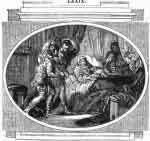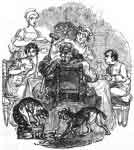A Miser divided his wealth into three Vases and had them secretly buried. He died and his three sons fought over which would get the biggest. All equal!
Don’t hold yourself above others.

JBR Collection
A covetous old man had, by his love of gold, amassed, during a long life, a very large quantity of it, which, in order to preserve with the greater security, he had deposited in three vases, and buried them, with much secrecy, deep in the earth. When at length, being on his death-bed, he called his three sons to him, and informed them of the treasure he had left them, and of the spot in which it lay hid, in three separate Vases–one for each of them–he could not finish all he had to say: a fainting fit seized him, and he expired. Now, as the young men had never seen these Vases, they concluded that in all probability they would differ in size and value; and as their father expired before he could assign to each his particular Vase, that business must be settled by themselves. Thus, on the division of their wealth they entered into warm dispute, each laying claim to the largest Vase–one because he was the eldest; the second son because he had no property in lands to support him; and the youngest because he was always the favourite of his father, and therefore was sure the largest share would havc been bequeathed to him, had his dying parent been but able to finish his last speech. Words at length ran very high, and quickly came to blows, from which none of them escaped unhurt; when, after all this wrangle, ill-blood, and mischief done, it was discovered, on digging up the three Vases, that they were exactly equal in size and value.

Northcote
[Note: The Northcote fable is the same fable as in the JBR Collection above. Only the illustrations and Application associated with the fable in the Northcote book are displayed here.]
Application
How often do we witness instances similar in their consequences to those which this Fable displays, where the acquisition of wealth has been productive of much unhappiness to those on whom it fell, and also where questions of little or no importance have been the cause of fatal quarrels, and have given birth to the most serious evils!
How many tedious and ruinous suits at law might have been avoided, had the parties concerned but patiently examined into facts with coolness and deliberation, instead of giving way to the blind selfishness of interest and passion, by which mortal hatreds have been generated, or blood spilt, when a generous search after truth would have prevented all the evil! J. N.

